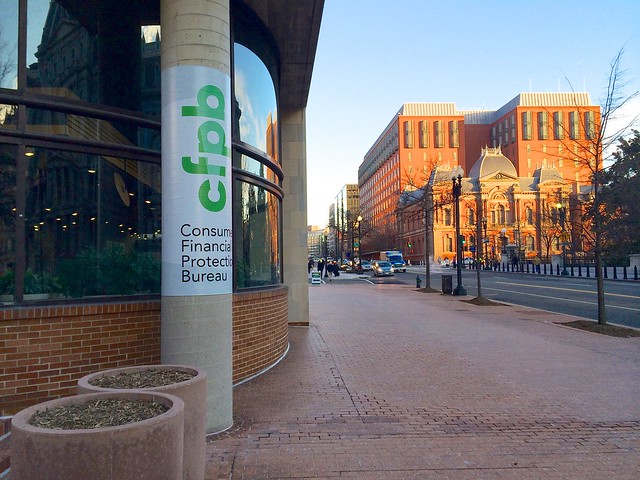
Each year approximately 12 million Americans take out a payday loan. Today, August 19, 2019, marks the date that borrowers should have been afforded some relief and protection from this predatory industry. Instead, borrowers remain largely unprotected from these financial products, which in many states have triple-digit interest rates attached.
The Consumer Financial Protection Bureau (CFPB), the federal agency responsible for protecting consumers from “unfair, deceptive, or abusive practices…”, had set today as the original compliance date for its small-dollar lending rule regarding “Payday, Vehicle Title, and Certain High-Installment Loans.” The long-awaited rule was finalized in 2017 under the leadership of then-Director Richard Cordray and, among other important protections, included an ability-to-repay provision which would require lenders to assess a borrower’s ability to repay the loan by verifying the borrower’s net income, living expenses, and financial obligations before extending the loan. According to the CFPB itself,
The Bureau has determined that risky lender practices are pushing borrowers into debt traps or forcing them to cede control of their financial decisions. Chief among these problems is that consumers are being set up to fail with loan payments that they are unable to repay. Faced with unaffordable payments, cash-strapped consumers must choose between defaulting, re-borrowing, or skipping other financial obligations like rent or basic living expenses such as buying food or obtaining medical care. The CFPB found that these practices can also lead to collateral damage to other aspects of consumers’ lives…
Despite this conclusion, the CFPB, under new leadership, announced in February 2019 its proposal to rescind the ability-to-repay provision and its decision to delay the rule’s compliance date to November 19, 2020, three years after the rule was finalized.
As college students and young adults, it is so easy to overlook the rule and the implications of its delay, viewing it as one of the thousands of regulations introduced by lawmakers every year which may not affect us personally. We forget that millions of individuals and families will directly experience the harmful consequences of the delayed compliance date. A 15 month delay has real implications for our neighbors; 15 additional months that consumers will be left vulnerable to the debt traps created by payday loans.
PAYDAY LOANS AND THE DELAY OF THE THE SMALL DOLLAR LENDING RULE
Payday loans are short-term, small-dollar loans with exceptionally high interest rates attached. Typically, a payday loan ranges between $100 and $500 and needs to be paid back within two weeks. These loans have an average annual percentage rate (APR) of 390 percent, and some states allow interest rates over 1,000 percent. Often located in low-income communities of color, payday lenders target financially vulnerable individuals and families during their time of need. Payday loans, which are advertised as quick and easy financial relief, may seem attractive to borrowers at first, but are designed to cast borrowers into a cycle of debt within weeks of taking out the original loan. Borrowers who are already financially insecure are usually not able to repay their loans on time and often have no choice but to take out another loan to cover the original loan. On average, borrowers take out eight loans in a year to cover the cost of the original loan. In a 2016 article titled “Predatory Lending And Fixing The Small Loan Market”, Rachel Anderson and Katie Thompson explained,
Fixing the payday loan market is complex… Although the CFPB can address underwriting and re-borrowing, it cannot regulate interest rates. Only state legislatures and Congress can. Yet, an inclusive cap on interest and fees is one of the simplest ways to discourage predatory lending and limit loopholes… The payday industry’s track record indicates an intent not to deal fairly with their customers but to make a profit from them at any cost. But that does not mean that we should throw up our hands and allow these businesses to continue to exploit the vulnerable. There is much we can do.
The CFPB’s finalized rule marked a step in the right direction. However, its decision to delay the rule and its proposal to rescind important provisions is a significant setback. Under the leadership of Director Kathy Kraninger, the CFPB announced in February its proposal to,
…rescind the rule’s requirements that lenders make certain underwriting determinations before issuing payday, single-payment vehicle title, and longer-term balloon payment loans. The Bureau is preliminarily finding that rescinding this requirement would increase consumer access to credit … The Bureau’s proposal suggests there was insufficient evidence and legal support for the mandatory underwriting provisions in the 2017 final rule. Additionally, the Bureau is concerned that these provisions would reduce access to credit and competition in states that have determined that it is in their residents’ interests to be able to use such products, subject to state-law limitations.
The proposal was open for public comment for 90 days, and the Bureau is currently reviewing comments and will make a final decision in the coming months.
RESPONDING TO PREDATORY LENDING
As Christians, we carry a special responsibility to care about the issue of payday lending and the people who are affected by it. The Bible strongly condemns the practice of usury and explicitly prohibits taking advantage of the poor and those who are vulnerable (Proverbs 22:22). We are called to fight against the exploitation of the vulnerable. Christians must speak out and take action to pursue economic justice and advocate for policies that respect the God-given dignity of every person. We must call upon government to promote policies which will offer our neighbors hope rather than robbing them of their dignity.
The government plays a crucial role in ending predatory lending practices and it has a responsibility to promote just lending. The Center for Public Justice’s Economic Justice Guideline defines one of the government’s responsibilities as upholding a just framework for protecting the dignity of every person and maintaining public justice for the common good. This gives the government the authority to intervene when its citizens are being taken advantage of by predatory financial products. By rescinding the ability-to-pay provision in its rule, the CFPB would keep the door open for lenders to continue to exploit borrowers. In its public comment, Faith for Just Lending, a coalition of faith-based organizations and denominations (including the Center for Public Justice) devoted to ending predatory lending, wrote,
Requiring a lender to make a determination of a borrower’s ability to repay is a longstanding principle of the U.S. banking system. A strong rule must not only have strong upfront underwriting requirements, but effective back-end protections against repeated flipping of the loans as well.
Remembering its responsibility as a government agency tasked with protecting consumers, the CFPB should allow the small-dollar lending rule to go into effect as originally finalized in 2017, while maintaining strong protections like the ability-to-repay provision.
While critically important, government regulations alone will not fix the small loan market or eliminate the need for these loans in the first place. In its Principles for Just Lending, Faith for Just Lending articulates the need for both government and civil society in addressing predatory lending. The payday lending business model only succeeds when the borrower fails. This is not how businesses should operate in a free market. Human dignity should be prioritized over profit maximization and economic efficiency. According to the Principles for Just Lending, “Lenders should extend loans at reasonable interest rates based on ability to repay within the original loan period, taking into account the borrower’s income and expenses.”
The continued exploitation of borrowers based on the argument that there are no other alternatives for borrowers in crisis is unacceptable. There are many responsible credit options, including many offered by faith-based organizations and ministries, that model responsible lending, stewardship, and assist borrowers in their time of need without trapping them in a cycle of debt. Exodus Lending, Kansas City Loan Pool, Project GREEN, and the Jubilee Assistance Fund are just a few examples.
Local churches play an important role in calling upon the government to uphold justice, assisting families in their communities, and promoting responsible credit options. The Church should “teach and model responsible stewardship, offering help to neighbors in times of crisis” and can direct congregants and community members to responsible credit options.
Government, lenders, faith-based organizations and churches each have a unique role and responsibility in protecting borrowers from predatory loans and honoring the God-given dignity of all people. The payday lending industry favors and profits from the delay of the CFPB’s small-dollar lending rule’s compliance date. A delay of 15 months amounts to approximately 15 million payday loans taken out and $11.25 billion of loan fees incurred by families and communities across the United States. As we acknowledge today’s date, let it serve as a reminder call to government, civil society, and citizens to act on behalf of borrowers exploited by payday loans and to promote policies that protect our neighbors, all of whom are close to God’s heart.
Debora Haede attends Calvin University (MI), majoring in International Relations and minoring in Economics with a Pre-Law specialization. She was as an intern with the Center for Public Justice during the summer of 2019. Photo courtesy of Ted Eytan.



